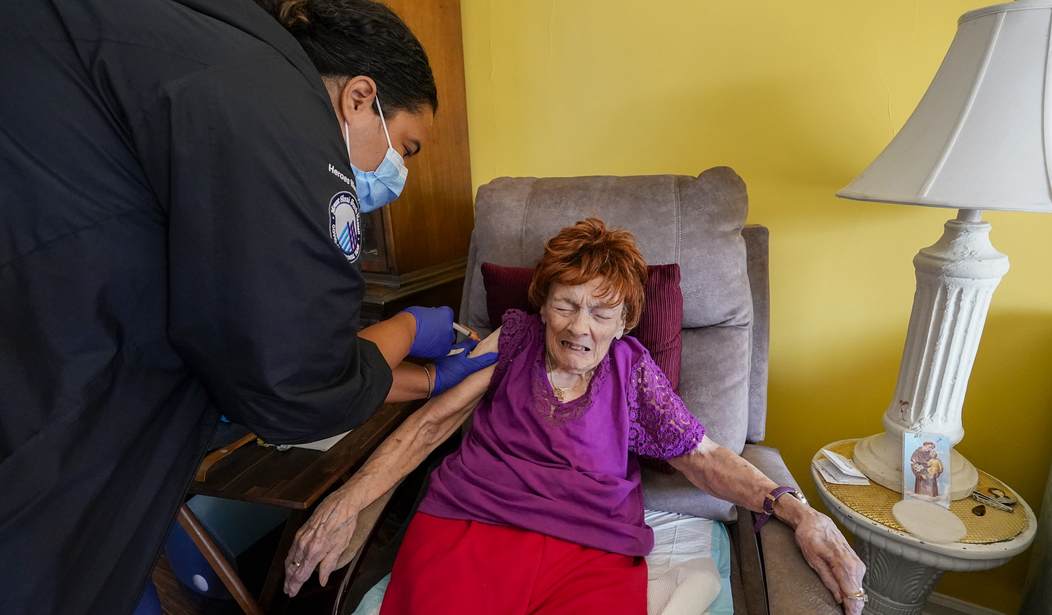How often do America’s two top public-health agencies issue a joint statement telling a major pharma company, “Um, thanks, but the product you’re pushing is unnecessary”?
I think they have a good reason, which I anticipated in this post last night. They’re worried that Pfizer raising the prospect of a third shot at a moment when the feds are laser-focused on getting first and second doses into holdouts will spook the unvaccinated, turning them against vaccination irretrievably. “Two shots and you’re done” is a more attractive sales pitch than “Actually, you need three, and we’ll let you know if and when you need a fourth.”
A lot of bureaucrats are pissed at Pfizer today for complicating the message, I’d guess.
CDC and FDA in joint statement pushing back a bit on Pfizer saying it thinks a booster shot is needed: pic.twitter.com/jIctdDRcAK
— Peter Sullivan (@PeterSullivan4) July 9, 2021
Some scientists are annoyed too, sensing that Pfizer’s more interested in its bottom line by publicizing its booster than in good science:
Vaccine manufacturers: instead of engaging in profit-fantasy endless wishful thinking about boosters, how about you focus on manufacturing and distributing doses to the rest of the world first? https://t.co/MdkfFNfJmd
— Dr. Angela Rasmussen (@angie_rasmussen) July 9, 2021
The other PR problem with Pfizer pushing a booster now is that it’ll lead some skeptics to question whether the two-dose regimen is as effective as the experts say. Every study of the B.1.617 Delta variant so far indicates that two shots are sufficient to prevent serious illness. (How effective they are at preventing infection is a separate question. More on that below.) How do you convince the unvaccinated that taking the plunge will spare them from Delta when you have Pfizer spokesmen shouting in the background that a third dose to spare them from Delta is in the works?
What makes Delta so threatening, anyway? The New York Post has an editorial today surmising that B.1.617 is actually less dangerous than previous strains of COVID, in keeping with the fact that viruses tend to become less deadly as they evolve. There’s some new data from the UK that might support that:
Just two fully-vaccinated people under 50 have died from the Delta variant of coronavirus, new figures show…
Overall, there had been 259 deaths out of 170,063 Delta cases up to 5 July, according to the Public Health England (PHE) technical briefing released on Friday.
Meaghan Kall, an epidemiologist from PHE, wrote on Twitter that this case fatality rate of 0.2% – meaning two deaths out of every 1,000 Delta cases – is down from 0.3% two weeks ago and is “very encouraging”.
Great news. But is the case fatality rate down because Delta is less dangerous or is it down because (1) virtually every senior citizen in the UK is vaccinated and (2) the unvaccinated people responsible for most infections tend to be young, with strong immune systems capable of fending off B.1.617? This same report notes that “Among double-jabbed people over 50 with the Delta variant, there were 116 deaths out of 5,234 cases.” That shakes out to a case fatality rate of 2.2 percent, which feels not so great for a cohort of fully vaccinated people.
A new study out of China may explain why Delta is so hyper-contagious and possibly deadly in unvaccinated people:
A new study, published online Wednesday … finds that the variant grows more rapidly inside people’s respiratory tracts and to much higher levels, researchers at the Guangdong Provincial Center for Disease Control and Prevention reported.
On average, people infected with the delta variant had about 1,000 times more copies of the virus in their respiratory tracts than those infected with the original strain of the coronavirus, the study reported.
In addition, after someone catches the delta variant, the person likely becomes infectious sooner. On average, it took about four days for the delta variant to reach detectable levels inside a person, compared with six days for the original coronavirus variant.
I’ll defer to people who know what they’re talking about on whether a variant that produces 1,000 times the viral load of the original strain is likely to be “less dangerous” than the original. India’s experience with the variant this past spring isn’t encouraging.
Watch this typically insightful exchange with Scott Gottlieb on the prospect of a Pfizer booster to combat Delta. Gottlieb is a member of Pfizer’s board so if you want to discount his comments on grounds that he has a financial interest, feel free. But he has a possible explanation for why some studies show Pfizer’s vaccine to be very effective (around 88 percent) at preventing infection by Delta while the study this week from Israel showed it was only 64 percent effective — namely, time. The studies that showed strong protection against infection by B.1.617 used subjects who were vaccinated recently, within the past two or three months. But in Israel the vaccination effort has been full steam for six months now; some of the vaccinated people who are testing positive may have had their shots very early, in which case their susceptibility to Delta may mean that their immunity has waned over time. That would be especially likely in older people, whose immune systems aren’t as robust, and of course Israel prioritized senior citizens in the earliest stage of the vaccination campaign, many months ago. The takeaway, per Gottlieb, is that seniors in the U.S. might need a booster whereas young vaccinated people might not.
"The cohort who are becoming mildly and asymptomatically infected post-vaccination are predominantly older individuals vaccinated six or seven months ago," @ScottGottliebMD speaking about studies in Israel showing why a booster vaccine might be necessary. pic.twitter.com/xoDsFJLlf3
— Squawk Box (@SquawkCNBC) July 9, 2021








Join the conversation as a VIP Member